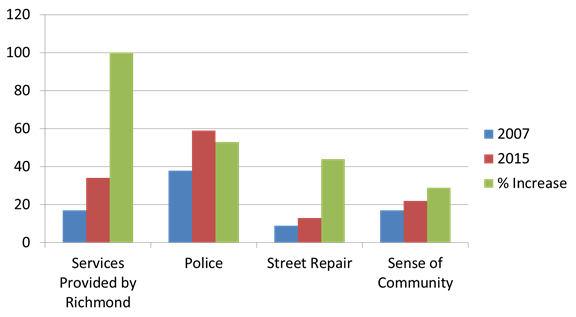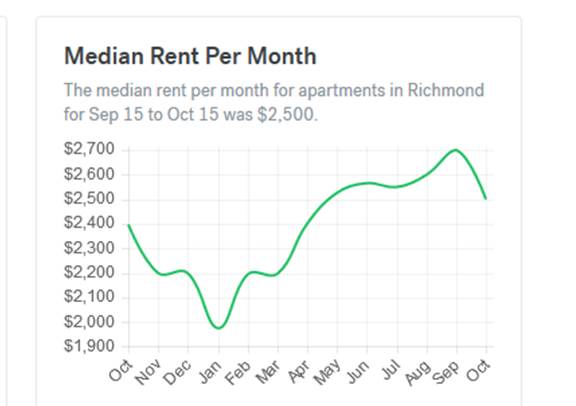With 21 days left and anticipation building, it’s nice to be a spectator instead of a participant in the campaign. As a spectator, I provide the following thoughts as dispassionately as I can..
You wouldn’t necessarily know it from watching City Council meetings, monitoring social media, or even attending candidate forums, but most people in Richmond actually approve of the direction the City is going. In 2007 when the Community Surveys started, only 20% of residents believed Richmond was an excellent or good place to live, and 32% rated the City of Richmond as a poor place to live. Eight years later, in 2015, 41% rated Richmond as an excellent or good as a place to live, and only 12% rated it as poor. That’s a 105% improvement in approval and a 62% drop in disapproval.


This positive outlook was bolstered by a poll from just last month where an all-time high of 57% of residents believed Richmond is headed the right direction. Why is this important? It bodes well for incumbents, and not so well for challengers who typically have to run “against City Hall” and advocate change.
Incidentally, I have been told that my approval rating as mayor hovers around 60%, a mayoral high since polling has been done in Richmond over the last several years. I think that is an indication that voters prefer a pragmatic progressive over candidates who are in either the radical or conservative extreme. I also note that I was the first Richmond mayor in a long time to receive a majority of the vote rather than just a plurality.
Unlike many past elections, there is no wedge issue in this campaign like a casino or Chevron. Measure L is certainly divisive, and indications are that it will probably pass handily, but its popularity doesn’t seem to be rubbing off on City Council candidates, even though each has been forced to take a side. Voters don’t seem to care whether candidates support Measure L or not. By now anyway, it is out of City Council hands and in the hands of the voters. In short, it’s old news, and rents are falling in Richmond, not rising.

https://www.trulia.com/real_estate/Richmond-California/
Currently, the most important issue for voters is “crime” at 30%, while even with Measure L front and center, only 11% of residents believe “affordable rent” is the City’s highest priority. Despite Richmond’s historically low unemployment rate that remains close to the state and federal levels for perhaps the first time since WWII, the next highest concern of residents is “economy and jobs” at about 15%. So candidates who are perceived to support an effective police department and economic development are expected to do well.
According to recent polling, front runners for the three contested City Council seats are Nat Bates, Jael Myrick, Jim Rogers and (Gasp!) Corky Booze. However, Booze, whose apparent early lead appears to be largely a result of name recognition, is also adversely and uniquely affected by sky-high negative perceptions that will probably (and hopefully) eliminate him as a front runner. I will allow myself one bit of editorializing and ask people to remember that Booze is probably the worst City Council member in history -- homophobic, xenophobic, vitriolic, erratic and disruptive. Booze’s incessant rants helped set new records for seemingly endless City Council meetings also with endless recesses to restore order that went on into the early morning hours. In fact, the City Council had to adopt a new set of rules designed solely to limit Booze’s domination of the agenda just to get through meetings at all. Those rules haven’t been used at all since Booze left the City Council.
Significantly below the front runners but still with moderate support are RPA candidates Ben Choi and Melvin Willis as well as Cesar Zepeda. Neither Choi nor Willis are well known outside RPA circles, and both are first-time candidates, historically not a recipe for success in Richmond elections. Cesar Zepeda is doing better than Pimple and Uwahemu but was not well-known outside his Hilltop base prior to campaign season.
Backing by the RPA seems to be a mixed blessing. On one hand, the RPA emerged from the 2014 election as Richmond’s most powerful and best-funded political machine.
On the other hand, the 2014 election represented the apex of RPA popularity, as its three candidates prevailed and it rode to power in the backlash of a David versus Goliath campaign massively funded by Chevron. Consumed by hubris, irrationality and naivety, the RPA engaged in a series of public policy gaffes that began peeling off its supporters like the leaves off an artichoke. In the last two years, the RPA:
· Embraced the world of paranoia and conspiracy theories by sponsoring a resolution putting the City of Richmond on record as opposing space weapons and mind control, not to mention believing World Trade Center destruction was a U.S. le conspiracy.
· Initiated a vendetta against the Richmond Police Department, fomenting suspicion and distrust, among other things saying the Richmond Police Officers Association members “defend racist murders.”
· Opposed affordable housing projects as well as market rate projects that would contribute millions of dollars towards affordable housing in inclusionary housing in-lieu fees.
· Became the driving force behind rent control and Measure L. Despite its popularity, rent control lost the RPA many of its previous supporters and probably gained few new ones.
· Criticized the proposed Global Campus and hectored UC Berkeley to the point that the project was abandoned. An RPA City Council member stated, “Richmond …will not allow residents to suffer from the campus’s arrival.” Now, they are trying to kill any economic development at Point Molate.
· Tenaciously promoted a budget-balancing, non-starter plan that required hundreds of higher skilled and management level City employees to take huge pay cuts, some in the tens of thousands of dollars.
· Continues to disrespect and even vilify the business community, collectively characterizing all corporations as evil.
· Has earned a reputation for fiscal irresponsibility, criticized by the East County Times as the “fiscally undisciplined Richmond Progressive Alliance…biggest deniers of the city’s fiscal crisis”
Despite a flurry of support on social media following recent candidates forums, Vinay Pimple and Uche Uwahemu are trailing the pack, suffering from lack of name recognition and a lack of widely-known record of accomplishments familiar to the larger electorate. Even though Uwahemu ran for mayor with a respectable showing in 2014, he has been invisible for the last two years. Pimple was appointed to the City Council in 2015 and has benefitted from that exposure, but he has never run for office previously to establish critical name recognition.
The reason I have endorsed Jael Myrick and Jim Rogers is that they are not only good candidates whom I know well from serving with them, but I feel they are in the best position to finish ahead of Corky Booze and the RPA candidates. As I have said previously, I think a majority of RPA members on the Richmond City Council would be a disaster. The RPA continues to tout their success in “taking Richmond back from Chevron,” but whether you believe that or not, any one group “owning” Richmond is not in anyone’s best interest, whether it is Chevron or the RPA.
I don’t agree with Jael Myrick or Jim Rogers on everything, but I know I can work with them, and for the most part, they have supported me over the years. Unlike the RPA, they are willing to negotiate and compromise when necessary. They have been good on environmental issues, have stood up to Chevron and were critical in negotiating the $90 million Environmental and Community Investment Agreement with Chevron that included the precedent-setting Richmond Promise Program. Both have been a part of the “Richmond renaissance” that has more than doubled residents’ positive perception of the City as a good place to live.
Measure M is not polling well, but there is no organized campaign for it for against it. I will continue to urge voters to support Measure M, which in terms of quality of life in Richmond, could arguably be the most important item on the ballot. |

